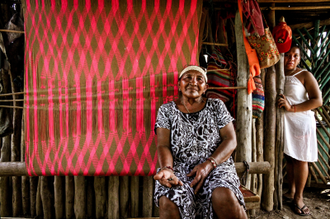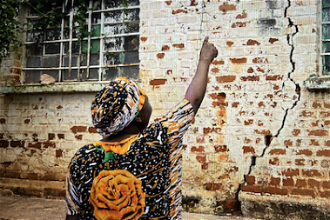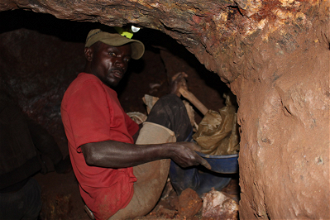London: Indigenous leaders and activists challenge multinational giant over destructive mining

Wayúu healer and her granddaughter, displaced by Cerrejón coal mine in La Guajira, Colombia
Indigenous leaders and activists challenged mining giant BHP Billiton over destructive mining at its London AGM on 19 October. From the frontline of the movement for environmental and social justice, they spoke about the destruction caused by BHP - from forced displacement around the Cerrejón coal mine in Colombia, to the impact of the Samarco dam disaster in Brazil.
Their visit was facilitated by the London Mining Network, an alliance of 30 development, environmental human rights and solidarity organisations which is supported by many Church groups. One of these is the Columban Missionary Society which has seen the negative impact of large scale mining in the Philippines.
Angelica Ortiz, indigenous Wayúu woman from the Lomguato Reserve in Colombia and General Secretary of Fuerza de Mujeres Wayúu (Wayúu Women's Force) said: "Cerrejon Coal, the biggest opencast mine in Colombia, has been present for four decades. More than 32 million tonnes are exported annually. Of this, 11% goes to South America and 46% to Europe. The exploitation and export of this coal, and the company's intention to double these quantities, have led to the violation of fundamental rights of the African-descent, Wayuu and peasant communities of La Guajira, the second poorest province in the country, which has long suffered the consequences of the social and armed conflict. Around 35 communities have been displaced by mining activity. Just five have been partially resettled. The health and livelihoods of the people have been affected, along with their access to water. The communities and local organisations, in alliance with different sectors of society, have joined forces to denounce the environmental and territorial implications of mineral extraction and to seek alternatives for the defence of life, land and water."
Seb Ordonez Munoz, War on Want's Senior International Programmes Officer (Latin America) said: "BHP's record of catastrophic environmental damage and forced displacement of indigenous and Afro-descendant communities stretches back decades. Despite a rhetoric of social responsibility, communities are still being forced violently from their homes, with no certainty about their future. Corporations like BHP are at the heart of the fossil fuel industry, unscathed and unaccountable. Meanwhile, at a global moment of mega-storms, record temperatures and droughts, people living in affected communities are on the frontline of a planetary struggle for all our futures. But in such an unequal world it is they, the poor and indigenous people, who bear the brunt of the fallout, both of fossil fuel extraction and the catastrophic global warming it's unleashing."
On the day of the AGM the London Mining Network released its report on the Samarco dam disaster which devastated communities all along the Rio Doce river system in Brazil two years ago. Around 1.4 million people are seeking urgent action to remediate ecosystems and restore livelihoods. 'The River is Dead: the impact of the catastrophic failure of the Fundão tailings dam', by researcher Paul Robson, examines the impacts on people through lost lives, homes and livelihoods, plus the efforts of Samarco's owners to tackle those impacts. Samarco is a joint venture 50% owned by BHP.
LINKS
The River is Dead: the impact of the catastrophic failure of the Fundão tailings dam can be viewed online at: http://londonminingnetwork.org/2017/09/the-river-is-dead-lmn-launches-report-into-brazils-samarco-disaster/
London Mining Network: http://londonminingnetwork.org/


















